Simon Makin
Science Journalist
Simon Makin is a freelance science journalist based in London, specialising in neuroscience, cognitive psychology, and mental health. He also covers the life sciences more broadly, and technology where it intersects with mind or health. His work has appeared in Scientific American Mind, Scientific American, New Scientist, Nature, The Economist, Spectrum, and more, online and in print. He is also available for freelance copy editing work.
Neuroscience & Psychology
Reporting on cutting-edge developments in neuroscience; both the technologies involved and the understanding of brain and behaviour they elicit. I also cover important or interesting findings from psychology that help illuminate the mind, thought, emotion, or perception.
Mental Health
I hope to dispel stigma and raise awareness by communicating clearly the complexities of mental health. I have written often on topics ranging from psychiatric genetics and computational psychiatry, through new therapies, to neurodegenerative disease.
Molecular Biology & Genetics
In covering these topics I picked up a fair amount of molecular biology and genetics. I have put this to good use covering a wide range of health stories, from the influence of the gut microbiome on fitness, to the future of cancer treatment through multi-omics.
Examples of My Work
Below you will find several of my articles, as laid out in print publications. Mostly full length features, together with a couple of long news items and a teensy mini-feature.
On the right (below, on mobile) is a list of selected online articles, spanning most of my career. Primarily news items, with a couple of features. The first is a “guest blog” I had published before landing my first paid gig, which remains a piece I’m particularly proud of.
^^ jump to top
Articles in print
-
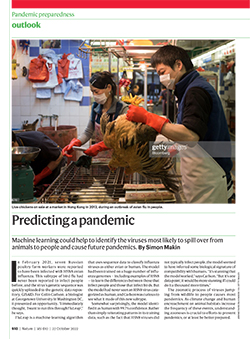 Predicting a Pandemic
Predicting a PandemicIn-depth feature on efforts to predict aspects of future pandemics, such as which viruses might be most likely to jump from animals to humans. For a Nature Outlook on Pandemic Preparedness, 27 Oct, 2022.
-
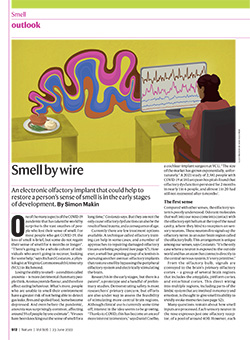 Smell by Wire
Smell by WireA short feature on the researchers trying to develop an electronic implant to restore a sense smell in people with anosmia. For a Nature Outlook on Smell, 23 June, 2022.
-
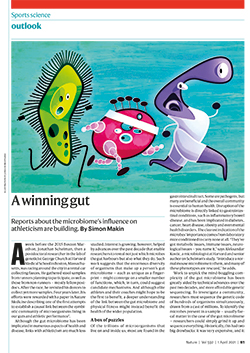 A Winning Gut
A Winning GutA short feature on early attempts to determine whether - and how - the gut microbiome might influence athleticism. For a Nature Outlook on Sport Science, 1 April, 2021.
-
 Beyond the Genome
Beyond the GenomeA feature on transcriptome, proteome, and multi-omics approaches to understanding and treating cancer. For a Nature Outlooks on "Precision Oncology", 24 September 2020.
-
 Personality Pursuits
Personality PursuitsA "Lab Work" profile of Simine Vazire, a personality researcher who campaigns to improve research methods in psychology and leads the Personality and Self-Knowledge Lab at the University of California, Davis. For the APA's Monitor on Psychology magazine, November 2019.
-
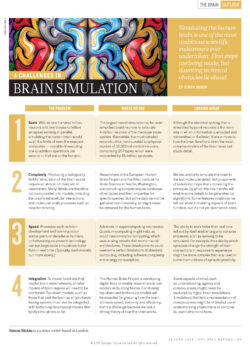 Four Challenges In Brain Simulation
Four Challenges In Brain SimulationA "Four Challenges in..." structured mini-feature on brain simulation. For a Nature Outlooks on "The Brain", 25 July 2019.
-
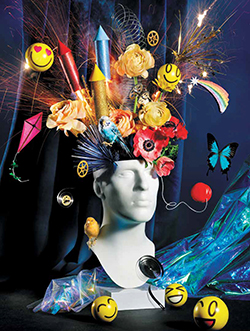 The Undiscovered Illness
The Undiscovered IllnessAn in-depth feature asking whether people who experience only mania should be diagnosed with bipolar disorder. Originally commissioned by Scientific American Mind, published by Scientific American, March 2019.
-
 Keeping Our Heads
Keeping Our HeadsA feature exploring the effects of digital technology on cognition and mental health. For a Nature Outlooks on the "Digital Revolution", 29 November 2018.
-
 The Amyloid Hypothesis on Trial
The Amyloid Hypothesis on TrialAn in-depth exploration of the evidence underlying the amyloid hypothesis - the dominant theory of what causes Alzheimer's disease - together with some emerging alternative ideas. For a Nature Outlooks on "Alzheimer's Disease", 26 July 2018.
-
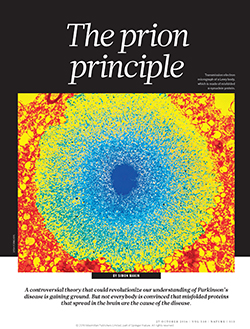 The Prion Principle
The Prion PrincipleA feature exploring the evidence for and against the prion theory of Parkinson's disease - the idea that all neurodegenerative diseases are caused by the spread of misfolded proteins. For a Nature Outlooks on "Parkinson's Disease", 27 October 2016.
-
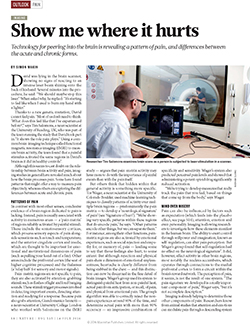 Show Me Where It Hurts
Show Me Where It HurtsA feature about what brain imaging can and cannot tell us about pain, whether acute or chronic. For a Nature Outlooks on "Pain", 14 July 2016.
-
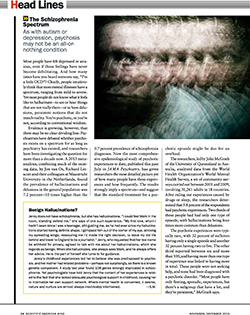 The Schizophrenia Spectrum
The Schizophrenia SpectrumA long news story reporting on the largest survey of psychotic experiences to date, suggesting psychosis exists on a spectrum, like many mental health conditions. This story made the front page of Reddit, with hundreds of people discussing their psychotic experiences. For Scientific American Mind, December 2015.
-
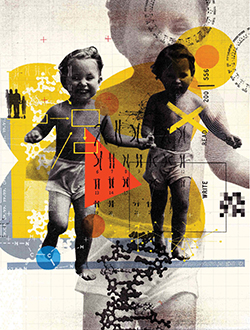 What Really Causes Autism?
What Really Causes Autism?A feature describing the accumulating evidence showing that ASD is primarily a genetic condition, and what researchers have been able to learn from it. For Scientific American Mind, November 2015.
-
 A Unified Theory of Depression
A Unified Theory of DepressionA long news story reporting on research suggesting psychometric tests may both predict response to antidepressants, and unite biomedical and psychological descriptions of depression. For Scientific American Mind, January 2014.
-
 The Man Who Weighed Thoughts
The Man Who Weighed ThoughtsA feature describing the efforts of 19th century Italian physician Angelo Mosso to measure brain activity using a simple balance, and the surprising results of a modern attempt to replicate them. For New Scientist, 16 November 2013.
Selected Online Article
Scientific American, News, “A Hormone May Boost Cognition in Down Syndrome” 1 September 2022
Scientific American, News, “Restrictions on Psilocybin ‘Magic Mushrooms’ Are Easing as Research Ramps Up” 1 August 2022
Scientific American, News, “An Inventory of All the Brain Cells That Let You Run, Jump and Roll” 6 October, 2021
Scientific American, News, “Hypnosis Experts Cast Doubt on Famous Psychological Experiments” 21 October 2020
Scientific American, News, “How Coronaviruses Cause Infection—from Colds to Deadly Pneumonia” 5 February 2020
Scientific American, News “Can an Illusory World Help Treat Psychosis’s Real-World Delusions?” 2 August 2019
Scientific American, News, “Behind the Buzz: How Ketamine Changes the Depressed Patient’s Brain” 12 April 2019
Scientific American, News, “A Blood Test for the Body’s Clock”
1 January 2019
Scientific American, News, “Prosthetic Limb Restores a Sense of Body Position” 1 August 2018
The Economist, News, “Do adult human brains renew their neurons?” 14 April 2018
Scientific American, News, “ ‘Bar Codes’ Could Trace Errant Brain Wiring in Autism & Schizophrenia” 30 March 2018
Scientific American, News “An Inner Look into the Minds and Brains of People with OCD” 4 October 2017
Spectrum, Feature, “From 0 to 60 in 10 years” 27 June 2017
Scientific American, News, “Fountain of Youth? Young Blood
Infusions “Rejuvenate” Old Mice” 21 April 2017
Scientific American, News, “”Neural Dust” Could
Enable a Fitbit for the Nervous System” 8 August 2016
Scientific American, News, “Tall Order–Heights in Other
Countries Elevate but U.S. Stature Tops Off” 1 August 2016
Horizon magazine, News Feature, “How conscious are you?” 18 December 2015
Scientific American, News, “A Red Flag for a Neurodegenerative Disease That May Be Transmissible” 1 September 2015
New Scientist, News, “Sleeping brains can process and respond
to words” 11 September 2014
Nature, News, “Running cures blind mice” 27 June 2014
The Economist, News, “The 3% Solution” 10 May 2014
New Scientist, News, “Ketamine-like drug lifts depression without the trip” 15 October 2013
New Scientist, News, “Memory drug trialled in people with Down’s syndrome” 11 April 2013
Scientific American Mind, News, “To predict success in children, look beyond willpower” 1 March 2013
Scientific American Guest Blog,“The Story of a Lonely Brain”
1 October 2012

Biography
 Originally from Liverpool, I did a B.Eng. in Electronics at the University of Reading, before working in the psychology department there, investigating how human hearing compensates for environmental distortions. I then did a master’s in Speech and Hearing Sciences at UCL, before moving back up North to do my PhD at the University of Sheffield. My thesis was in computational auditory scene analysis, specifically modelling how the auditory system exploits pitch differences to separate mixed speech. I then went back to Reading psych dept., introduced my boss to my PhD supervisor, and together we assembled a project researching how human hearing copes with room acoustics in order to improve machine listening in the real world.
Originally from Liverpool, I did a B.Eng. in Electronics at the University of Reading, before working in the psychology department there, investigating how human hearing compensates for environmental distortions. I then did a master’s in Speech and Hearing Sciences at UCL, before moving back up North to do my PhD at the University of Sheffield. My thesis was in computational auditory scene analysis, specifically modelling how the auditory system exploits pitch differences to separate mixed speech. I then went back to Reading psych dept., introduced my boss to my PhD supervisor, and together we assembled a project researching how human hearing copes with room acoustics in order to improve machine listening in the real world.
In short, I have degrees from engineering, phonetics and linguistics, and computer science departments, and spent several years working in a psychology department. All of which gave me an ideal multi-disciplinary background for a science writer, and means I understand how science works, from methods to culture. Writing was always my biggest passion though, so…
At the start of 2012 I jumped ship on academia and moved to London to retrain as a journalist, doing a fast-track NCTJ Diploma in Newspaper Journalism at Lambeth College, including brief stints at The Independent and The Lambeth Weekender. Once set loose upon the world, without ever making a conscious decision to specialise, I naturally drifted into my current brain-themed beat due to a mixture of interest, contacts, and opportunity. I will always be grateful to the editors who commissioned and nurtured me along that journey. You know who you are.
I am a member of the Association of British Science Writers, from whom I won a bursary in 2016 to attend the Centre for Investigative Journalism’s summer school – an exhilarating experience I’d recommend to any journalist of any stripe. I am also a member of science writers’ group, Neuwrite, London, and am a mentor in their mentorship scheme for aspiring science writers from underrepresented groups in science journalism.
Please get in touch if you’d like to discuss a writing project, commission me for science news or feature writing, or hire me for copy editing work. I’m always interested in working for new outlets. I am based in South East England.